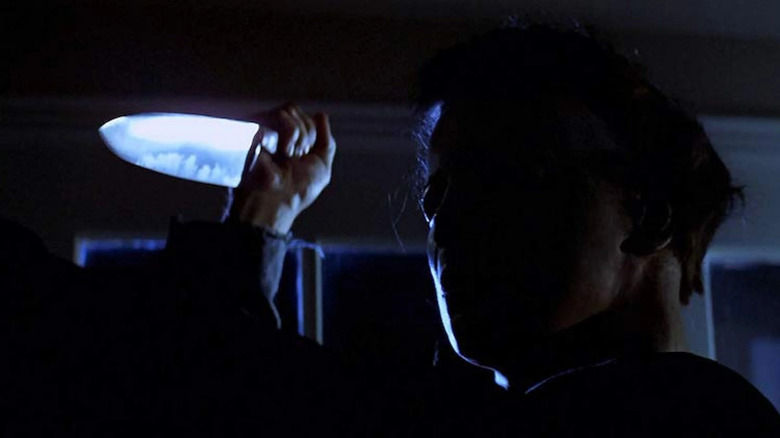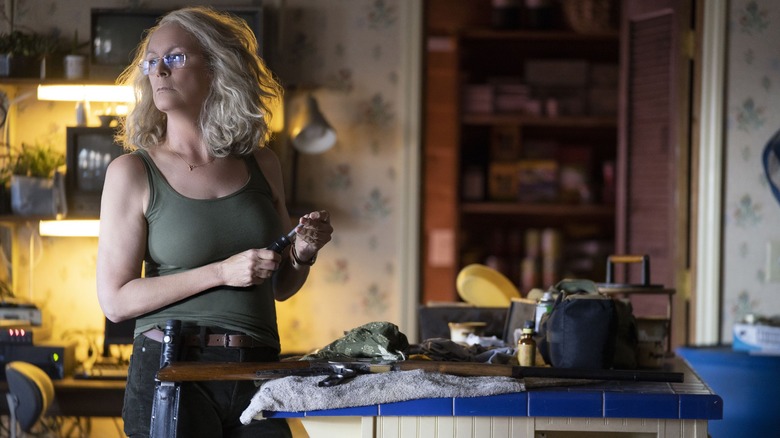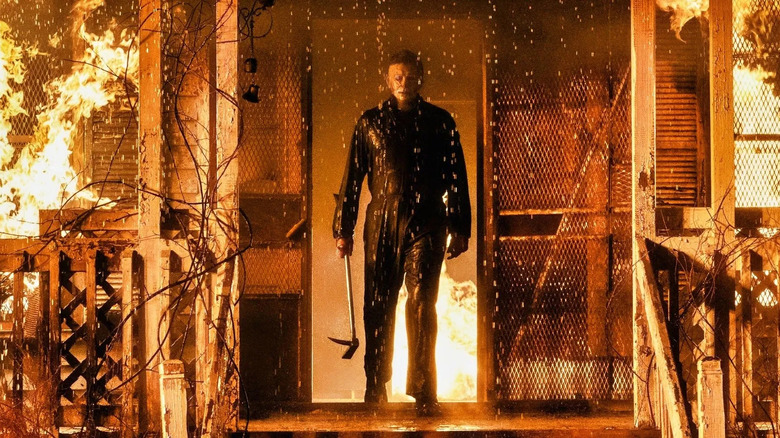39% Think This Is The Best Movie In The Halloween Franchise – Here's Why They're Right
(Welcome to Survey Says, a feature where we conduct a movie-related survey for a random group of people and explain why they're completely right, completely wrong, or somewhere in-between.)
The trajectory of the "Halloween" franchise has meandered more than a final girl in a corn maze. Since the inception of Michael Myers and his Samhain rampage across the perpetually beleaguered town of Haddonfield in 1978, the "Halloween" movies have since incorporated witchcraft, telepathy, a Druidian cult, and a kung-fu practicing Busta Rhymes among its babysitter murders. The creation of John Carpenter and Debra Hill, Myers has launched 11 sequels and reimaginings over four-plus decades. The iron is still hot in Haddonfield, too; the massive box office earnings from David Gordon Green's most recent Myers saga entry "Halloween Kills" has put the Boogeyman over the top, cementing the franchise as one of the horror genre's most lucrative and long-running.
With "Halloween Ends" still on the horizon for a fall 2022 release, we asked fans to weigh in on the film series, and opinions are in.
Survey says...
Keep in mind that the sample size is small; it might be best to imagine an exit poll of badgeholders at a film festival. But of the 611 respondents in the poll, it's no surprise to see the most love given to John Carpenter's original 1978 film. "Halloween" hacked and slashed its way to the top of the pops with a stout 38.95% of the vote, a proper tip of the hat for the movie that, depending on who you ask, launched the slasher cycle that would dominate the genre for the next decade.
Following the '78 original, the number two spot goes not to the number two film chronologically, but a revival sequel. David Gordon Green's "Halloween" comes in second with 17.68% of the vote, which matches up with the commercial success the film has enjoyed since its 2018 release. Jumping forward into a contemporary timeline, Green's version picks up 40 years after the events of the original with Jamie Lee Curtis reprising her role as Laurie Strode, who might or might not be related to Michael depending on which sequel is on deck. Green's entries discard all of the messy canon and stick to basics (meaning Laurie Strode and Michael are not related, nor is he controlled by mystic runes), which seems to be what the fans wanted.
The runners-up are composed of several middle-sibling sequels, with the course-correcting "Halloween IV: The Return of Michael Myers" snagging 11.78% of the vote. With no alternate cuts and a negligible number of excised scenes, the fourth chapter in the "Halloween" journey is one of the most stoutly developed stories of the franchise, with a clear mission statement coming off of the critical and commercial failure of its predecessor: bring back the Shape.
Trailing behind are Rick Rosenthal's direct 1980 sequel "Halloween II" with 9.66% (Carpenter didn't like it much, either), and "Halloween H20" coming in at 9.33% — a wild sight to see for those who remember the late '90s hoopla surrounding "H20" and the return of Curtis as Strode. Kevin Williamson's script rewrites (giving the youthful characters dialogue closer to that of "Scream" and "Dawson's Creek") put the slasher in a place of prominence among the teen horror cycle of the decade. How the mighty have fallen.
Bottom of the pack
The Myers-free "Halloween III: Season of the Witch" isn't far behind "H20" at 8.18% of the popular vote. "Witch" has enjoyed a revitalized evaluation in the past decade, with fans gaining an appreciation for its dedication to the actual holiday in its story as well as its unique mean-spiritedness. But for many fans, it'll just always be the one entry without Michael Myers.
These numbers are a far cry from the 4.42% of voters in praise of "Halloween Kills," a slight tragedy for one of the few sequels to use the town itself to mythologize Michael Myers, rather than just relying on the (nonetheless fantastic) harbinger warnings of Donald Pleasance's Dr. Loomis. The gulf between reception of "Halloween" (2018) and "Kills" is sort of understandable, as the former stands more on its own and the latter is clearly the bridge of a three-part series. With that said, both parts of the Green-Blumhouse trilogy clear the slate of previous attempts to explain or expand Michael Myers, and instead focus on his most appealing aspect: he is more myth than man. Laurie Strode said it herself in 1978: he is the boogeyman. A high body count can bring notoriety, sure — just ask Leatherface. But holding a populace in fear to the point that your name is whispered like Voldemort is the most direct line to legendary status — ask Freddy or Jason.
It's refreshing to see the minds behind "Halloween" '18 and "Kills" finally exploring that barely-trodden path towards myth-making. The cult storyline of "Halloween: The Curse of Michael Myers" explains a bit too much regarding the killer himself, but also makes the fascinating choice to have the Shape show up at a town festival, thus spreading the terror further than a quartet of teens and some local cops — a blood-covered child is found twirling and singing under a hanging corpse!
Dustin McNeill and Travis Mullins' book "Taking Shape: Developing Halloween From Script to Scream" reveals that in an early draft of the "Halloween 6" script, writer Daniel Farrands wanted an expanded town celebration for Myers to crash, with a vehemently anti-Halloween mayor that would have recalled Larry Vaughn's Amity Island mayor in Steven Spielberg's "Jaws." Too many cooks in the kitchen resulted in an overdeveloped sequel that underwhelmed fans, but perhaps David Gordon Green's attempts to make Myers big and bad again — via the townspeople — can be heard as an echo of Farrand's efforts to shake up the formula. Seeing the mob mentality at work in "Kills," it's safe to say that when "Halloween Ends" comes around in October, evil won't be the only thing dying that night.


